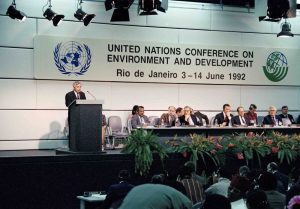The United Nations Conference on Environment and Development, held on June 3-14, 1992 in Rio de Janeiro (also known as the Earth Summit), recognized sustainable development as an achievable goal and acknowledged that incorporating and balancing economic, social and environmental concerns to meet human needs is vital and, at the same time, it requires the adoption of a different way of producing, consuming, making decisions and generally shaping the way we live. One of the most important outcomes of this Conference was the formulation of Agenda 21, an action plan to address the then existing problems and prepare for the challenges of the 21st century through the common consensus of the cooperation between states on development and environment. Finally, it is significant to refer to the drafting of the "Rio Declaration on Environment and Development", the establishment of the Commission on Sustainable Development and, most importantly, the application of the 3 Conventions: United Nations Convention to Combat Desertification, the Biodiversity Convention and the Framework Convention on Climate Change (UNFCCC), respectively. The content of the latter is the priority of the international system.

The Rio Summit 1992, United Nations Conference on Environment and Development.
Πηγή: Institute of Environmental Science and Social Change- ESSC




